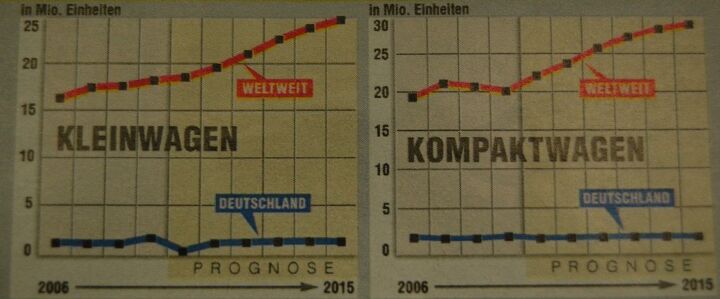German Brands Move Towards Small FWD Cars… But Not For Germans
Mercedes, BMW and Volkswagen/Audi are all moving inexorably towards a major downmarket expansion, as they develop a new generation of compact and subcompact cars based on front-wheel-drive architectures. Though Volkswagen has played in this space for some time, the move is a major cultural shift for BMW and Mercedes, which are typically associated with rear-drive luxury cars, particularly in the US market. But the truth is that the German luxury brands have always sold products in the German and other European markets that don’t match their premium overseas brand images (see, among other examples, the ubiquity of Mercedes taxis in Germany). But the strange thing about this next push towards smaller cheaper cars is that it’s not not aimed at Germany at all.
As the graph above [via Auto Motor und Sport’s August print issue] shows, German demand for compact (Kompaktwagen) and Subcompact cars (Kleinwagen) is not expected to grow by any significant amount by 2015. And to some extent, this helps justify the concept of premium small cars, as they would theoretically extract higher transaction prices out of otherwise flat demand. But that’s not reason enough to expand into small FWD segments alone, and as the graphs show, overseas sales are expected to carry the burden of small car sales growth globally. Though much of this global growth will come from low-cost car sales in China and India, the German brands can’t simply cede all the momentum to non-premium brands. Especially since small premium cars are slowly starting to be taken seriously in mature markets like the US, thanks in part to pioneers like BMW’s MINI brand.
But how low can you go? BMW kept the more-functional hatchback variants of its 1-Series out of the US in favor of a coupe-only approach, in hopes of maintaining its premium prestige there. Will its MINI-based “City” (aka “Zero-Series”) sell in decent volume in the US without hurting the RWD-only BMW brand? The new Mercedes A-Class (not to mention a possible smaller sibling) will face the same challenge, as it’s said to be based on a front-drive chassis co-developed with Nissan-Renault (potentially making it related to future US-market Nissans). Ditto Audi, which is ahead of the game with its just-released A1, and will head even further downmarket with its rebadge of the forthcoming VW up!. Again, the German market is used to these brands offering a range of products, from the pedestrian diesel taxis to super-expensive ‘bahn-burners, but outside of Germany, where growth in these small cars is expected to take place, that precedent doesn’t exist.
Of course, the real motivation for these companies is as much based on tightening emissions standards as it is on small car demand growth, so the market should be shifting to better accommodate premium front-drive compact and subcompact cars. Still, managing the transition from the current big, powerful, premium perception of German luxury brands to one that can include small, mass-market style front-drivers will be a huge challenge. And as yet, we’re not seeing a concerted effort to start getting American and other non-German consumers used to the brand image that Germans have grown comfortable with over the years.
More by Edward Niedermeyer
Latest Car Reviews
Read moreLatest Product Reviews
Read moreRecent Comments
- Lou_BC No. An EV would have to replace my primary vehicle. That means it has to be able to do everything my current vehicle does.
- Bkojote @Lou_BC I don't know how broad of a difference in capability there is between 2 door and 4 door broncos or even Wranglers as I can't speak to that from experience. Generally the consensus is while a Tacoma/4Runner is ~10% less capable on 'difficult' trails they're significantly more pleasant to drive on the way to the trails and actually pleasant the other 90% of the time. I'm guessing the Trailhunter narrows that gap even more and is probably almost as capable as a 4 Door Bronco Sasquatch but significantly more pleasant/fuel efficient on the road. To wit, just about everyone in our group with a 4Runner bought a second set of wheels/tires for when it sees road duty. Everyone in our group with a Bronco bought a second vehicle...
- Aja8888 No.
- 2manyvettes Since all of my cars have V8 gas engines (with one exception, a V6) guess what my opinion is about a cheap EV. And there is even a Tesla supercharger all of a mile from my house.
- Cla65691460 April 24 (Reuters) - A made-in-China electric vehicle will hit U.S. dealers this summer offering power and efficiency similar to the Tesla Model Y, the world's best-selling EV, but for about $8,000 less.


































Comments
Join the conversation
As with the Mini and the 1-series, the BMW Zero should be successful. Sell it more on style and dynamics than actual utility and BMW's core market will gobble it up. The B-Class isn't a very nice Benz, though it is an especially spacious MPV. Bland, boring, buzzy... I think Audi has gotten it most right with their A3 and A1. The A2 was well and truly ahead of its time... so ahead of its time that it was too expensive for the market thanks to all the aluminum. Now that the premium subcompact market is maturing, it may be the right time to reintroduce the idea.
So far A1 seems to be hitting the mark: in spite of the higher prices (compared to, say, the sister VW brand), Audi is increasing production above original plans. http://www.autonews.com/apps/pbcs.dll/article?AID=/20100825/ANE/100829924/1131